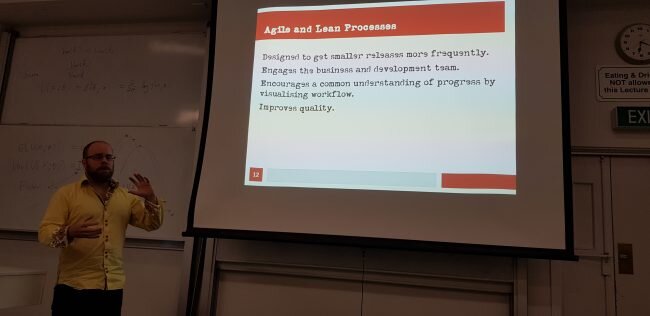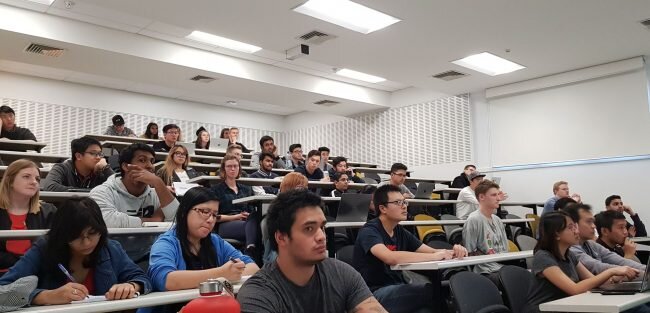Bootcamp Highlights - DevOps
Guest post from Joshua EspinasWe had the pleasure of having Simon Murcott talk to the Auckland SoT Community about DevOps. Simon brings 20 years of experience in this field and is very well known amongst the Wellington DevOps community. It is not uncommon for students to know very little about what DevOps is. So imagine the traditional flow of a project’s completion from start to finish: There are the architects that design the solution for a project, senior management then outline how long a solution will take and how much it will cost before your business analysts create detailed user requirements for the project. These user requirements form the framework from which developers create the solution before passing it on to the testers to make sure the system works according to the user requirements – all of this is overseen by your project managers. Once you have a fully tested, functional solution, it now needs be delivered to its users, this is usually taken care by the operations team. This is where a DevOps engineer comes into play – they are literally a hybrid of developers (dev) and operations (ops). Simon illustrated that working in DevOps is a versatile role mainly in charge of: - Deploying a system solution to its users; automating this in processes called “Continuous Integration” and “Continuous Deployment” (often abbreviated to CI and CD). - Monitoring the system's performance and playing a crucial role if the system breaks down. All of this is done through many iterations in an Agile setting.
It is not uncommon for students to know very little about what DevOps is. So imagine the traditional flow of a project’s completion from start to finish: There are the architects that design the solution for a project, senior management then outline how long a solution will take and how much it will cost before your business analysts create detailed user requirements for the project. These user requirements form the framework from which developers create the solution before passing it on to the testers to make sure the system works according to the user requirements – all of this is overseen by your project managers. Once you have a fully tested, functional solution, it now needs be delivered to its users, this is usually taken care by the operations team. This is where a DevOps engineer comes into play – they are literally a hybrid of developers (dev) and operations (ops). Simon illustrated that working in DevOps is a versatile role mainly in charge of: - Deploying a system solution to its users; automating this in processes called “Continuous Integration” and “Continuous Deployment” (often abbreviated to CI and CD). - Monitoring the system's performance and playing a crucial role if the system breaks down. All of this is done through many iterations in an Agile setting. Simon says that the industry is always changing – technologies relevant today are not likely to be relevant as soon as 6 months from now! The advice he gives to any budding DevOps engineers is to be a flexible learner open to working with a wide variety of technologies. So if you are someone who likes having knowledge in all aspects of software development rather than specialising in a few languages/technologies, I strongly recommend considering the DevOps scene. Simon tips us that the industry is largely heading towards the Cloud. So some knowledge of how AWS (Amazon Web Services) uses the Cloud can work in your favour. Other helpful tools that are helpful to read into are Git and Docker. Have no experience? That’s okay! Since the field is constantly evolving, Simon said DevOps employers are looking for people who have a motivation to learn new things rather than knowing the relevant technologies. So being able to demonstrate this and having a knowledge of a DevOps engineer’s role goes a long way. I hope reading about this gives an insight of what a DevOps engineer is and sparks an interest in some of you.
Simon says that the industry is always changing – technologies relevant today are not likely to be relevant as soon as 6 months from now! The advice he gives to any budding DevOps engineers is to be a flexible learner open to working with a wide variety of technologies. So if you are someone who likes having knowledge in all aspects of software development rather than specialising in a few languages/technologies, I strongly recommend considering the DevOps scene. Simon tips us that the industry is largely heading towards the Cloud. So some knowledge of how AWS (Amazon Web Services) uses the Cloud can work in your favour. Other helpful tools that are helpful to read into are Git and Docker. Have no experience? That’s okay! Since the field is constantly evolving, Simon said DevOps employers are looking for people who have a motivation to learn new things rather than knowing the relevant technologies. So being able to demonstrate this and having a knowledge of a DevOps engineer’s role goes a long way. I hope reading about this gives an insight of what a DevOps engineer is and sparks an interest in some of you.
